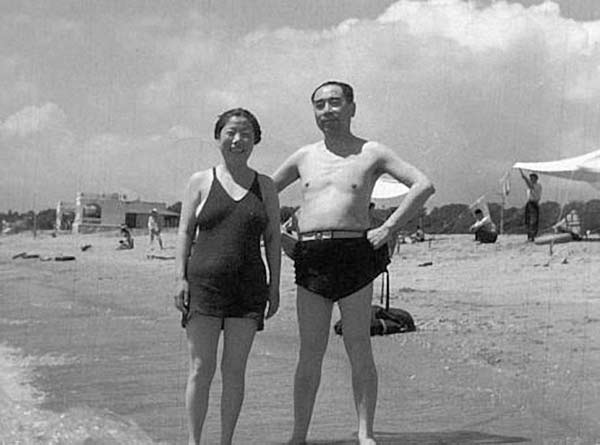 |
|
Late Premier Zhou Enlai with his wife Deng Yingchao at the Beidaihe Beach Resort in 1954. Photo by Lyu Houmin / For China Daily |
|
|
"Beidaihe is the summer resort in China with the most political significance. As a former summer office of the central government, it was once the government's decision-making center," Wang was quoted by Southern Metropolis Daily as saying.
"The summer office system has been abolished but the government-sponsored vacation system for experts still exists. The recent meeting is a gesture from the government, which attaches great importance to talent."
"I have some friends who work at the Rest House for State Leaders and good friends who are local government officials. Most of my knowledge about the top leaders' work and vacation in Beidaihe was from them. I've also double-checked some of the information with the staff there," Sun said.
"The region is forbidden to outsiders but security is not so strict except in summer. I managed to visit the place four times in the past few years and my last visit was in 2010," he said.
Sun is especially fond of the architecture. He took many photos of the villas where top leaders have stayed, such as the No 95 building for Chairman Mao Zedong, a German pastor's former residence at No 27 that Premier Zhou Enlai used, and No 16, which housed Deng Xiaoping.
Exotic styles
"With some maintenance and improvement inside, more than half a century has passed and these buildings have not changed much in appearance. Most of the original owners of these villas were foreigners. These villas are rich in historical and research value; features like spacious verandas give the place an exotic feeling," he said.
The houses were mostly made of granite and located against the hills and facing the sea. No two buildings are identical, Sun said.
"The interior decoration also boasts other foreign elements like arched doors and windows and fireplaces and attics. Facilities are not luxurious but very simple. They are more like old-fashioned hotel rooms. Some of the facilities inside are quite old and cannot be compared with five-star hotels nowadays."
Luo Diandian, daughter of Luo Ruiqing, China's first minister of public security, recalled in her book that her family would move to Beidaihe every July and August. Families of top leaders would enjoy the beaches together during those stays, she wrote.
"Besides swimming, entertainment activities in Mao's period would include dancing parties or watching movies and enjoying operas," Sun said.
Marshal Zhu De was the first top Party official to vacation in Beidaihe, in June 1949. He fell in love with the place and returned every summer till his death in 1975.
As someone who enjoyed swimming, Chairman Mao was very fond of Beidaihe. He would plunge into the sea whenever he got a chance and not return to shore until he had swum his fill.
Mao first arrived at Beidaihe on April 21, 1954. He spent his longest time in Beidaihe in 1955 when he was drafting his official report on issues of agriculture and dealing with daily routines.
"Let's go to the beach, where the tide matches the tide of socialist construction," Mao told one of his guards, according to the book The Tracking Report on the Days in Beidaihe by Xu Yan, a professor from the PLA National Defense University.
A story about one of Mao's visits remains popular, Sun said. One day Mao was on a hovercraft and spotted a small boat. A fisherman was found taking crabs out from the net. Mao showed great interest in the catch and the two had a nice talk for a long time.
Even so, the fisherman did not recognize Mao and said he had to go back to sell the crabs. Mao bought all the crabs and the fisherman was very happy. When he returned, Mao treated all the employees in his office to a crab feast.
Late leader Deng Xiaoping also became a frequent visitor to Beidaihe following his first visit in 1953. Deng often took his family to the resort for summer vacation. Every time Deng arrived at Beidaihe, he would swim in the sea after a short rest and did the same on the day of his departure, recalled people close to him.
In 1986, when he was meeting Japanese guests in Beidaihe who asked about his health, Deng said he had two ways to test his condition - whether he could still swim in the sea and whether he could still play cards.
Yang Wanli and Han Junhong contributed to this story.
